Obituary: Rosa Bouglione, the undisputed queen of the circus
- Published
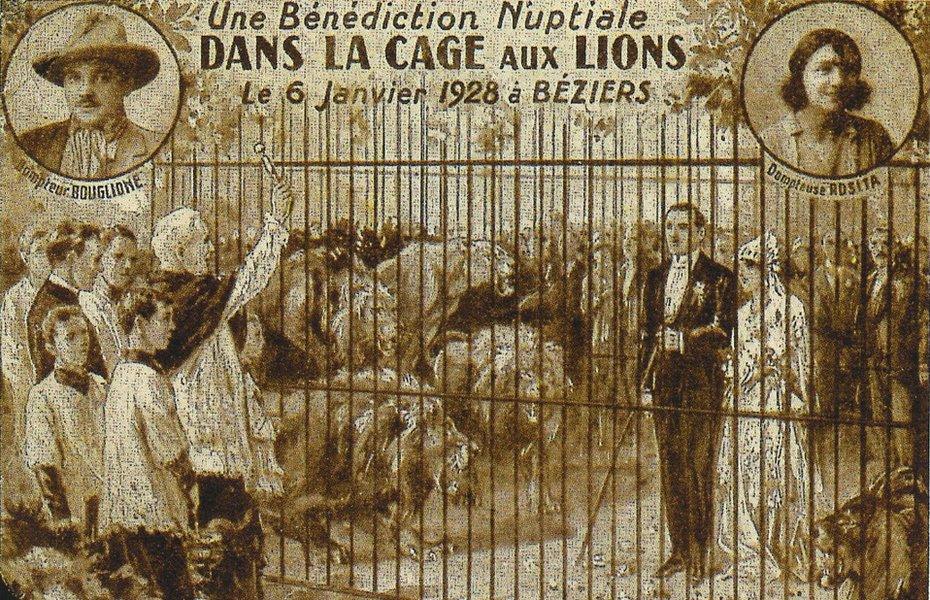
Depictions of the Bougliones' marriage inside a lion's cage were sold as postcards in France, and graced magazine covers
When Rosa Bouglione was married inside a lion's cage, the pastor, despite his best efforts, was made to stay outside. It wouldn't have been much of a wedding had he been mauled.
It was only appropriate that this was where Rosa had chosen to be married. After all, she had started her career inside a lion's cage, working as a serpentine dancer, in her mid-teens.
This was the circus life into which she was born, in the back of a horse-drawn caravan in Belgium in December 1910. Her father was an animal trainer with the family outfit, Ménagerie Van Been, and they toured Europe alongside their snakes, bears and lions.
"I was born in a caravan, and that's where I left my heart," Rosa would later write in her autobiography. Aged 17, however, there was another contender for her heart: she fell for a man from another circus family, Joseph Bouglione, who she said reminded her of a cowboy, and the two were married among the lions.
Their honeymoon was as unusual as their wedding - they spent it working with the troupe of the Wild West Show, established by hunter and showman Buffalo Bill Cody.
Rosa's life after joining the Bouglione family brought her close to France's high society and made her a household name, even if attitudes towards the circus began to change in her later years.
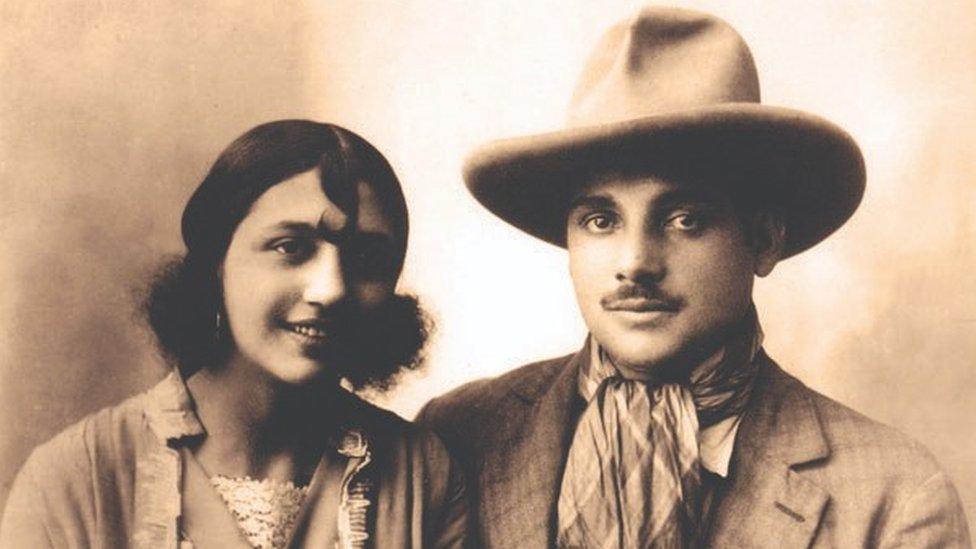
"He was always so well-dressed," Rosa said of Joseph Bouglione. "With his big hat and boots, he had the look of a cowboy."
Rosa Bouglione died in Paris on Sunday, 26 August aged 107.
Her funeral on Wednesday took place in the ring of the Cirque d'Hiver (Winter Circus), the 1,500-person venue in the Marais district which she and her husband's family took over in 1934.
The grand circular building, commissioned by Napoleon III, remained the Bouglione family's base, even as they, their animals, clowns and performers travelled the world. It was a life that Joseph Bouglione said was like a constant holiday.
In an interview in 2011, Rosa recalled one trip to Brazil, on which they were accompanied by 30 horses, 10 lions, six tigers and a polar bear, among other animals.
When the captain of the ship carrying them tried to throw the circus' elephants overboard to reduce the ship's weight during a storm, Joseph threatened to organise a mutiny and so the crew tossed away much of the cargo instead.
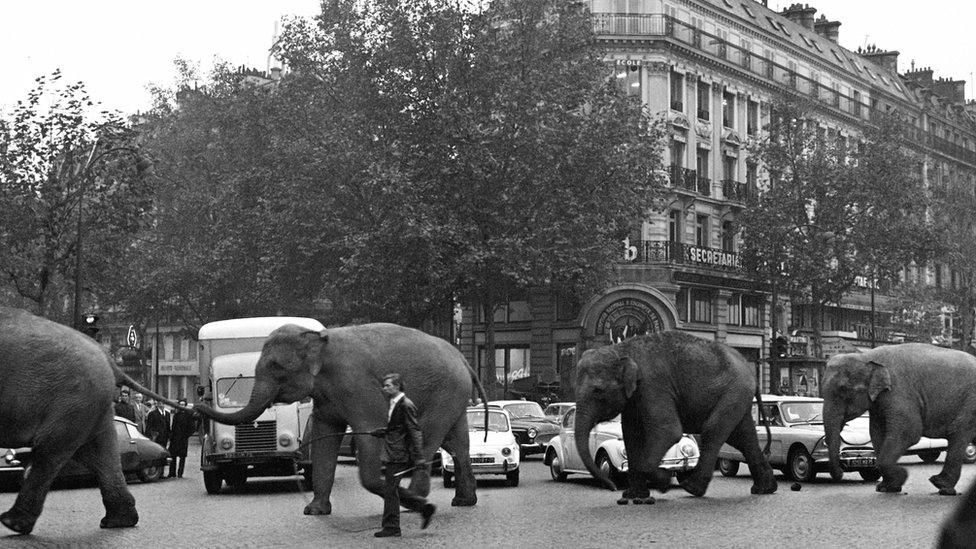
Elephants make their way from a Paris train station to the Cirque d'Hiver in 1965 after returning from a show in Germany
Running the circus was a feat of logistics: 100 trucks full of animals and equipment would have to be unloaded and then reloaded in a day, and 40 tonnes of cloth packed up tidily at the end of each show.
And then there was the small matter of managing the animals themselves. There was Jacky the gorilla, who would drink only Perrier water and would make hammocks out of the curtains of any hotels where the troupe stayed.
There was the anaconda which would squeeze the most attractive women a little tighter than the others. There was Coco, the foul-mouthed parrot who would fly to the balcony and scream "Help!" so loudly the police would come rushing round.

More lives in profile

Even as one of the biggest names in the circus world, the family was not always welcome on its travels, as Rosa told France's TF1 network in 2011. They were gypsies by origin, and were often treated with suspicion and subject to allegations as they arrived in a new town.
"I never understood it," she said. "People said we'd steal children. But we never did. We had our own children, we didn't need to steal children. But we just let them say this stuff."
It was the Cirque d'Hiver that provided the platform for some of the family's biggest shows and most notable successes. Among them was La Perle du Bengale, where one performer braved the full force of a whip strike, and damsels in distress fell into pools swarming with snakes.
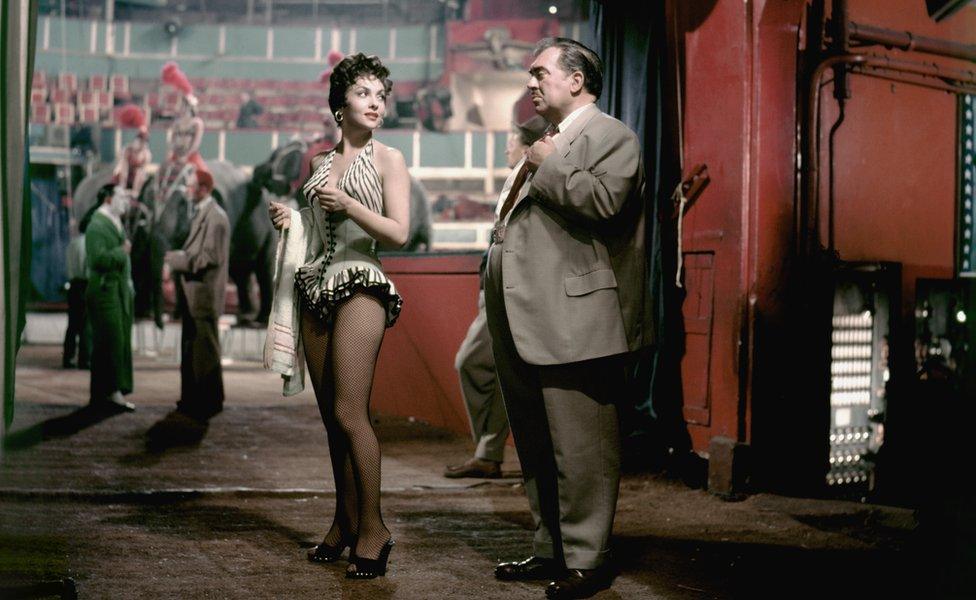
Actors Gina Lollobrigida and Thomas Gomez on the set of the 1956 film Trapeze, filmed at the Cirque d'Hiver
Rosa stopped performing and did more work behind the scenes of the circus, and over time, the venue attracted the biggest names from the entertainment world and regularly hosted live TV specials.
The actress, singer and black icon Josephine Baker was one, and soprano Maria Callas another. When Callas once got a little too close to Joseph Bouglione, she was almost crushed by an elephant that was wary of women other than Rosa being around him.
Rosa and Joseph eventually brought an end to their life on the road, moving in to a house around the corner from the circus in 1984.
Joseph died three years later but Rosa remained there until her death, surrounded by reminders of her career. Among them, the pelt of her pet leopard Mickey, that would sit on top of the dining table, his head still attached, seemingly snarling at any visitors.
She would still attend matinees into her old age, and would let the performers know her opinion. "The shows got bigger and the children got bigger, but I got smaller," she said.

Read other recent obituaries

Entertainment in 2018 is very different to that of the early 20th Century, when Rosa began dancing in the lion's cage.
Nowadays, the Cirque d'Hiver is just as well known as a concert venue, or as the setting for political rallies. The industry is also under growing pressure to end the use of live animals - a debate that has arrived in France a little later than in other countries.
Before his resignation this week, French environment minister Nicolas Hulot had said he was against the practice, and after the shooting to death of a tiger that had escaped from another Paris circus last November, campaigners renewed their calls for a ban on the use of live animals in shows.
In 2016, the Bouglione family announced it would no longer use an ageing elephant in its shows after an environmental group accused the circus of mistreating the animal.
But the family is divided about whether animals should still be a part of its performances.
Last May, one of Rosa and Joseph's grandsons, André, who founded his own circus, said he would end the practice. "It's because of my love of animals and out of respect for the public that I stopped this," he told the campaign group 30 Millions d'Amis in an interview, external.
"I saw a survey that said 80% of French people cared about animal rights. Our job is entertaining families. So if a very large majority of families believes this, we can't continue doing something that upsets them."
But another grandson, Francesco, who is now the director of the Cirque d'Hiver, has vowed to continue using animals and has condemned what he calls "eco-terrorism".
He told the Journal du Dimanche newspaper last year, external: "We're tired of being tainted by false claims, without mentioning the protests in front of our tents and acts of sabotage. This won't end well."
Mourners gathered at the Cirque d'Hiver to remember Rosa Bouglione's life
Rosa Bouglione leaves 55 children, grandchildren, great-grandchildren and great-great grandchildren, and a family name which remains above the entrance to the Cirque d'Hiver.
In a statement, her family said she was "the undisputed queen of the circus world", adding: "Her passion for the circus stayed with her until the very end."
A new show honouring Rosa's life, named Extra, will begin at the Cirque d'Hiver on 6 October.
- Published24 June 2018

- Published26 May 2018
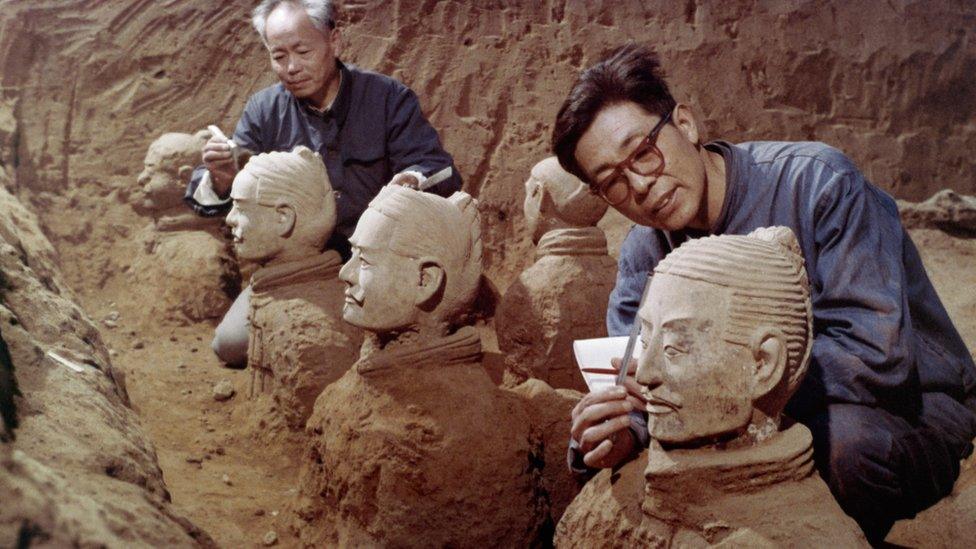
- Published18 March 2018
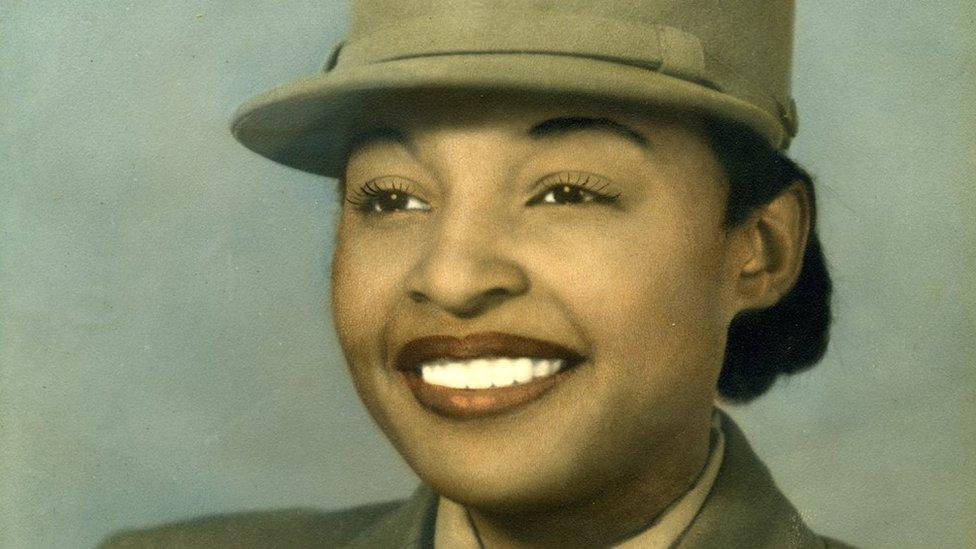
- Published25 March 2018
